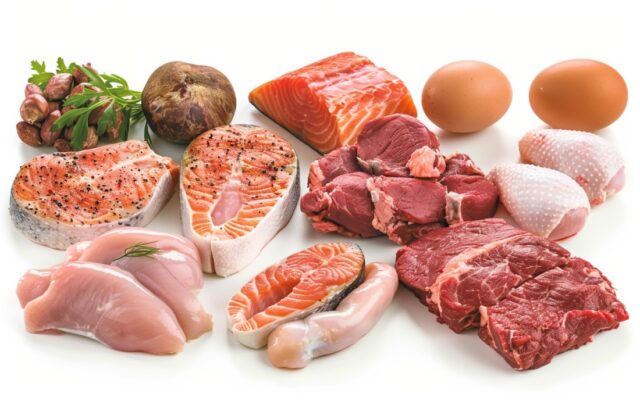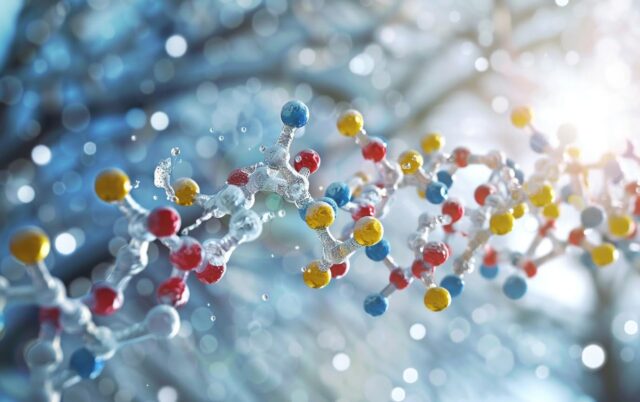Are you aware that a dog’s pretty fur is fully packed with proteins? This necessary ingredient serves as the basic component of a pet’s body and fuels its amazing activeness, supports strong immunity and keeps it healthy all the time.
Protein is crucial to every part of a dog’s health. It helps in creating powerful muscles that enable the animal race through the park or have a glossy coat which becomes an envy of many people.
The Power of Protein: A Deep Dive into Its Role
What is Protein and How Dogs Use It?
Proteins are large molecules made up of smaller units known as amino acids. There exist more than 20 different types of amino acids, some of which can be produced by dogs themselves. However ten essential ones cannot be synthesized within their bodies requiring them to get these components from food. These essential building blocks act like alphabets for proteins where different combination gives rise to various structures and functions.
When amino acids are brought together into particular proteins needed by body cells this process is called synthesis. Through this complex mechanism puppies grow quickly while repairing damaged tissues in adult dogs or producing enzymes as well as hormones among other functions necessary for normal functioning.

Beyond the Basics: Unveiling Protein’s Functional Powerhouse
We know already that protein forms foundation for good canine health but what else does it do? Let us take an in depth look at how diverse roles played by proteins within dog’s system:
Building and Repairing Tissues
All parts such as muscles, skin, hair or nails need protein so as to come up with new cells during growth period. For example, young pets must consume enough amounts of this important nutrient because their bodies develop rapidly. On the other hand even grown-up ones have to be supplied with sufficient quantities since they may require repairing tissues damaged due wear tear injuries surgeries etcetera failure which will result into muscle wasting thus becoming weak.
Beyond the Essentials: Exploring the Potential Benefits of Specific Amino Acids
Though we have talked about ten key types which are necessary for dogs’ wellbeing, there is more to it than just these components. Other non-essential ones like L-carnitine and taurine have been found beneficial for their health as well.
L-carnitine aids fat metabolism besides promoting energy production within an animal’s body; it can therefore be used effectively by active pets or those prone to gaining excessive weight since fats will be converted into usable fuel through this compound.
Taurine on the other hand plays a major role in ensuring normal heart functions which are important for good vision among pets too; recent studies indicate that apart from enhancing cognitive abilities among elderly dogs thus helping delay age related mental decline.

Choosing the Right Protein Source for Your Dog
Now that we understand the crucial role protein plays in your dog’s health, let’s delve into selecting the most suitable protein sources for their dietary needs.
Animal-Based Protein Powerhouses: A Detailed Look
- Chicken: Chicken is a very digestible protein source for dogs and can be easily obtained. A complete amino acid profile is boasted by the meat, which is also well tolerated by canines with sensitive stomachs. However, chickens may lead to allergic reactions in some dogs who have consumed them overtime.
- Beef: Many dogs like beef because it offers a rich flavor profile in addition to being another good source of complete proteins. Iron is also provided by this type of meat as well as other necessary nutrients; however, since beef tends to contain higher amounts of fats, moderation should be practiced especially with overweight or less active pets.
- Lamb: If your pet has an allergy towards chicken or beef then lamb might be suitable since it acts as a more gentle alternative. Lamb contains good levels of amino acids thereby making digestion easy on them but this protein could costlier than chicken or even some plant-based proteins.
- Fish: Some fish like salmon and sardines are high in omega-3 fatty acids that help reduce inflammation while promoting healthy skin/coat development too. Being highly soluble means fishes get broken down quickly into essential body-building blocks such that they become ideal for dogs having sensitive tummies. Nevertheless, certain breeds may exhibit allergies towards fish-based diets due to their location’s availability/costs variations.
- Eggs: Eggs have all required amino acids necessary for building blocks in a dog’s body plus other vital nutrients enclosed within them thus making eggs superb complete protein sources whether fed cooked or raw under vet supervision only They work well when dealing with meat allergic reactions among pets but still there could be cases where some individuals might develop egg allergies hence need slow introduction periods.

Many dog food formulas include chicken meal as a protein source. But you might wonder, “Is chicken meal safe and nutritious for my dog?” Let’s delve into this topic to understand the benefits and considerations when choosing a food with chicken meal.
Plant-Based Protein Alternatives: Navigating the Veggie World
For those who fall under categories such as vegetarianism, veganism or have animal protein allergies; plant based sources can serve as an option too. Nonetheless one should ensure that they are high-quality complete proteins formulated specifically for dogs because not all plant based protein powders meet the required standards.
Protein is important, yet it can also become a problem when in excess. However, this part will talk about how to identify that your dog lacks protein in their diet. Below are some common indications:
- Boring Fur and Falling Out: Nourishment’s sign is healthy skin coat. If the hair of your dog seems lifeless, brittle and sheds too much then it may be suffering from lack of proteins. Proteins are necessary for maintaining healthy skin and hair follicles.
- Muscle Waste and Weakness: Muscle tissue grows with the help of proteins. When a pet has muscle wasting or weakness mainly at back legs they might be consuming low amount of protein.
- Lackadaisical attitude & lesser activities: Energy comes from protein synthesis which plays an important role in dog’s metabolism so you should not neglect it! If suddenly your active canine friend starts acting tired all the time and loses interest towards what used to excite him before – consider checking his nutrition for deficits hereof.
- Frequent Illnesses: Protein makes immunity stronger than ever before possible! Therefore if there is no enough supply for this nutrient then their bodies won’t be able to fight off infections resulting into sickliness more often than usual.
- Slow Healing of Wounds: For tissues repairing needs more proteins. In case you notice that your pooch’s wounds take very long time to heal up – take note that there could be something wrong with its diet that slows down protein synthesis thus hindering up the process of recovery.
Conclusion
In this guide we have looked into various aspects regarding importance of proteins in dogs’ health. These include building blocks for tissues growth; repair damaged cells; support strong immune system among others which cannot be underestimated by any means necessary when it comes to feeding our four-legged companions well-balanced diets rich in these essential nutrients.
FAQs
Is complete protein different from incomplete ones for canines?
Yes they are! Full types have all indispensable amino acids (ten) that dogs cannot synthesize themselves, while incomplete ones don’t contain at least one. Generally complete proteins are found in animal-based products; however plant-based sources may require being combined so as to provide a full range of amino acid composition suitable for dogs.
Should I give my senior dog less protein if he is not active anymore?
Senior dogs usually need different quantities of proteins from younger ones due to their reduced levels of activities. Even though such aged animals might necessitate slightly lower amounts of proteins overall compared with puppies or adults – it still remains vital constituent for preserving muscle mass and supporting healthy immune responses among other functions. It’d be wise therefore consulting the vet who can advise on appropriate proportion based on specific needs of your aging pet.
Could excess protein harm puppies?
Puppies do require significant quantities since they are growing very fast but overdosing rarely happens here because it’s quite hard to surpass those limits without using artificially fortified diets specifically formulated for this purpose which could disrupt normal bone development patterns if not handled correctly during early stages when crucial milestones are being achieved.
Are there any other benefits associated with dog’s protein intake besides building muscles?
Definitely yes! Besides being important for healthy growth muscular tissues play various roles within body system too. Enzymes are made up largely by these substances hence without them living organisms cannot function properly; hormones also rely heavily on availability thereof thus influencing behavior skin condition etcetera; moreover repairs damaged cells may not occur effectively unless there is sufficient amount present in diet as well.
How can I tell whether my canine friend gets adequate amounts of this nutrient or not?
Typically a shiny coat good muscle tone and normal activity levels should suffice as proof that your canine friend receives enough nutritional support through his/her daily meals. However if excessive hair loss coupled with weak enterprises then it might be time to consult veterinary services about the same considering low energy levels associated with lethargy may signify anemia due to lack of iron which forms part either directly or indirectly within protein molecules themselves thereby making them vital constituents for blood production processes.

Healthy dogs mean happy dogs, and that makes me happy! I’m here to share all the tips for keeping your best furry friend in top shape, from puppyhood to their golden years.

